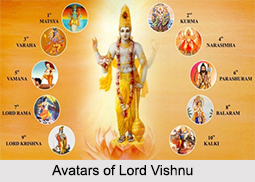 Vaishnavism is based on the devotion of Vishnu and his avatars. Its theology recognizes many forms of the one; single unitary divinity. Vaishnavas believe that the ultimate reality is personal. The God is the Supreme all-attractive person, or Krishna. They teach to chant the names of Gods so that the souls can reawaken their spiritual knowledge, live peacefully in their lives and finally return to the spiritual realm (Vaikuntha) after death.
Vaishnavism is based on the devotion of Vishnu and his avatars. Its theology recognizes many forms of the one; single unitary divinity. Vaishnavas believe that the ultimate reality is personal. The God is the Supreme all-attractive person, or Krishna. They teach to chant the names of Gods so that the souls can reawaken their spiritual knowledge, live peacefully in their lives and finally return to the spiritual realm (Vaikuntha) after death.
Vaishnava Sampradayas
There are four main sampradayas or Vaishnava lineages all based originally in India- Sri Sampradaya (Lakshmi); Madhva Sampradaya (Brahma); Rudra Sampradaya (Rudra) and Kumara Sampradaya (Four Kumaras). Vaishnavas worship Lord Vishnu, Lord Rama, and Lord Krishna as different manifestations of the same Supreme Lord or one supreme divinity, although the styles of worship differ.
Scholars on Vaishnava Theology
According to the scholars, different denominations of Vaishnavism are based on either theism, or pantheism or panentheism. But Vaishnavism (Madhva Sampradaya) started by Madhvacharya is based on monotheism tradition where Vishnu or Krishna is omnipotent. In contrast, Sri Vaishnavism sampradaya (Sri Sampradaya) associated with Ramanujacharya and being based on monothiesm, differs in many ways; they believe that Goddess Lakshmi and god Vishnu are inseparable equal divinities. But some scholar still think that Sri Vaishnavism emphasizes on panentheism rather than monotheism with its theology of "transcendence and immanence", where God interpenetrates everything in the universe, and all of empirical reality is God`s body. Vaishnava sampradaya associated with Vallabhacharya (Rudra Sampradaya), on the other hand, is based on pantheism. And according to Schweig, Gaudiya Vaishnavism of Chaitanya (branch of Madhva Sampradaya) is closer to polymorphic bi-monotheism because both Goddess Radha and God Krishna are simultaneously supreme in this tradition.
Precepts of Vaishnavism
Vaishnavism precepts include the doctrine of incarnation (avatars). Here Lord Vishnu incarnates in different times and different forms to set all things right and in balance in the universe. The avatars are Narayana, Vasudeva, Rama and Krishna. Each of the name is a separate divine figure with separate attributed supremacy and with separate tradition of Vaishnava beliefs.
Vaishnava Shastras
Vaishnava philosophy and its poetic sacred texts constitute a profound theology that forms a potential social discourse. Prime Vaishnava shastras and scriptures are basically Krishna"s teachings in the "Bhagavad-Gita", which is included in "Mahabharata", "Srimad Bhagavatam", "Ramayana" and "Sri Chaitanya-Charitamrita" of 16th century.









